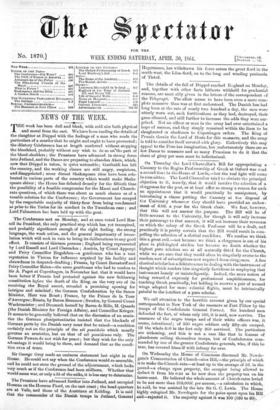The Conference met on Monday, and at once voted Lord
Rus- sell its President, the only practical step which has yet transpired, and probably significant enough of the right feeling, the strong language, the weak action, and the general impetuosity of irreso- lution which will seek in vain to bring its deliberations to any good effect. It consists of thirteen persons ; England being represented by Lord Russell and Lord Clarendon ; Austria, by COunt Apponyi and Privy Councillor Biegeleben—a gentleman who has a vast reputation in Vienna for influence acquired by his facility and shrewdness in despatch-drafting ; Prussia, by Count Bernstorff and Privy Councillor Balan—the same gentleman who had to confess to Sir A. Paget at Copenhagen, in November last, that it would have been better if Prussia had protested against the new Schleswig constitution before the death of the King, on the very eve of its receiving the Royal assent, revealed a promising opening for intrigue and mischief ; the German Confederation by the Saxon Minister, Herr von Beust ; France, by the Prince de la Tour d'Auvergne ; Russia, by Baron Brunnow ; Sweden, by General Count Wachtmeister ; and Denmark herself by Baron de Bille, M. Quaade (the Danish Minister for Foreign Affairs), and Councillor Krieger. It seems to be generally believed that on the discussion of an armis- tice the German plenipotentiaries insisted that the blockade of German ports by the Danish navy must first be raised—a condition certainly not on the principle of the uti possidetis which usually governs an armistice, but on that of uti possidemus only. The German Powers do not wish for peace ; but they wish for the only advantage it would bring to them, and demand that as the condi- tion even of truce.


































